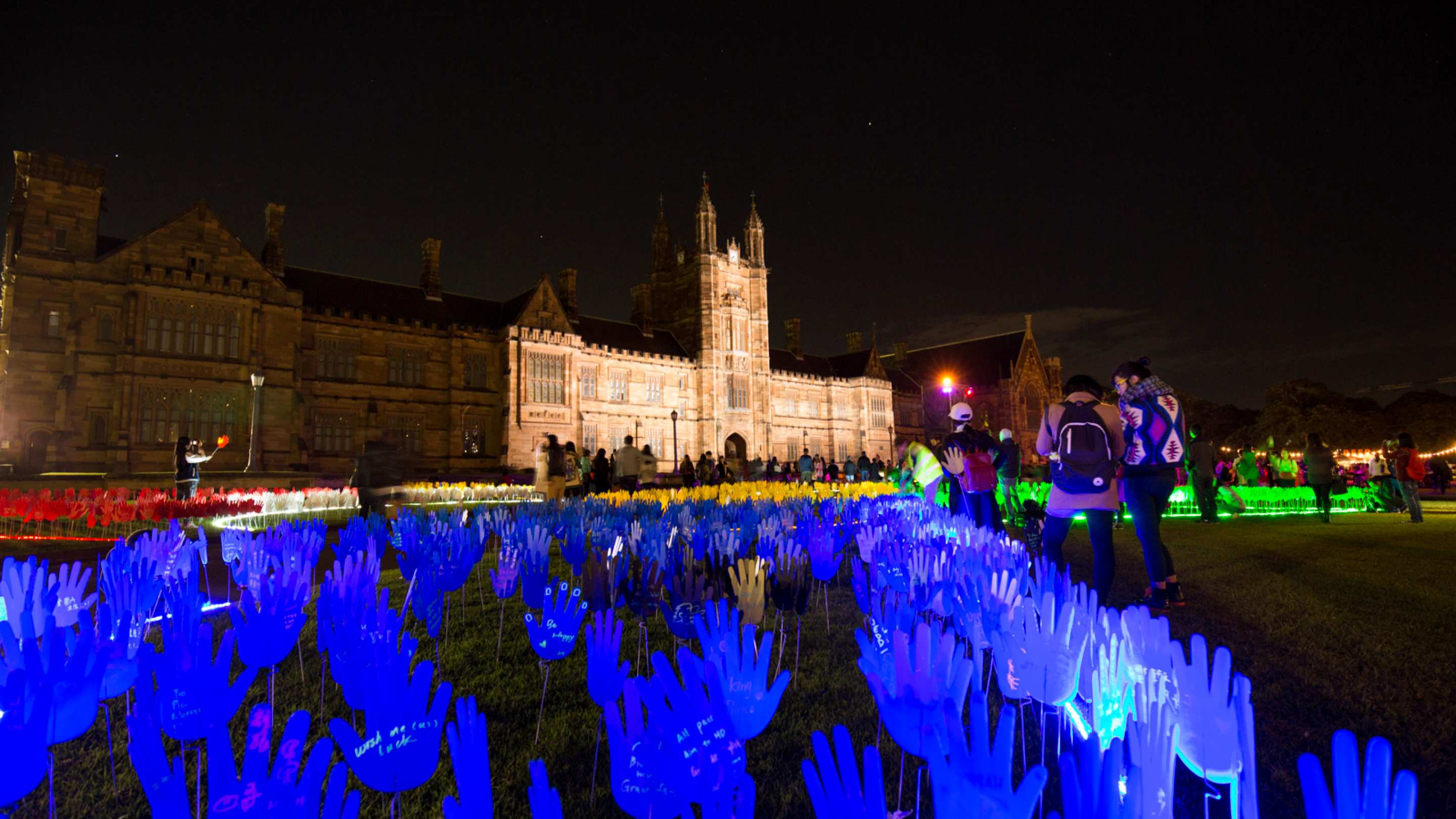Caution not a by-word for inaction on Indigenous affairs
It is time to come together to support a proposal that shifts the focus from courts and lawyers to Indigenous Australians themselves, writes Professor Anne Twomey.

A sea of hands mark National Reconciliation Week at the University's Camperdown Campus. Photograph: Virginia Baldwin
While there have been some criticisms of Noel Pearson's alternative proposal for constitutional recognition, most of them are misconceived.
What is proposed is the creation of an Indigenous advisory body that could advise both the government and Parliament on matters affecting Aboriginal and Torres Strait Islander peoples, so that laws and policies would be better targeted and more effective in achieving positive outcomes. This body would have no ability to delay legislation or veto the enactment of laws. Its role would be to give Aboriginal people a voice that could be heard and considered in Parliament, where its advice would be tabled.
It would not be bound only to advise once bills have been introduced to Parliament. It could give advice at any time, initiating idea, and advising on policy development well before any bills materialise. If Parliament is to have a special power to make laws with respect to Aboriginal and Torres Strait Islander peoples, then it only seems fair that those affected should at least be able to express views in a formal parliamentary way about how those laws should apply. A body that has been created by the will of the people, as evidenced by their votes in a referendum, would have moral and political authority, allowing it to influence both public debate and political decision-makers. It is this authority that would give it power, rather than any legal compulsion.
The proposal has been criticised for seeking to gain the support of "constitutional conservatives", mistaking this term as meaning people on the right wing of politics. What it is intended to describe, however, is those who are cautious about constitutional reform. Constitutional conservatives want to ensure that any reform is consistent with the existing structures and principles of the constitution and will not give rise to incessant litigation and unintended consequences.
Securing support
In this regard, the vast majority of Australian voters fall into the category of constitutional conservatives, as the referendum record has consistently shown. Voters don't want radical expansions of power or changes that disrupt, or are at odds with, the fundamental principles upon which the constitution rests. Securing the support of those constitutionally conservative voters is necessary to secure success.
Pearson's proposal is also criticised for not entrenching an anti-racial discrimination clause in the constitution. Yes, we can all agree that racial discrimination is wrong, but it is much harder to agree upon what types of laws and policies should be banned. We have already seen a divergence of views in relation to alcohol restrictions and the Northern Territory intervention. There are very strong views on the one hand that such laws are racially discriminatory and should be prohibited, and on the other hand that such laws are necessary to protect vulnerable women and children. An arbitrary legal rule is not sufficiently sophisticated to deal with the genuine concerns involved.
A constitutional ban on racial discrimination would also raise a litany of other questions about who is protected and who is not, the extent to which positive discrimination is permitted, whether a law or policy would be banned because it has an adverse effect on all, only some, or a majority of members of a racial group, whether every discriminatory provision of a law would have to be struck down or whether the law would have to be judged overall as adversely discriminatory in nature, and whether elevating one anti-discrimination right to constitutional protection, above all others, would unbalance the system and lead to unintended consequences. While the lawyers are fighting out all these issues during any referendum campaign, support for Indigenous recognition would slowly gurgle down the drain.
Finding the right proposal
The one thing that people can agree upon about the Northern Territory intervention is that it was unnecessarily rushed and Aboriginal people did not have a sufficient voice in how the laws should have been targeted and made more effective. This is where the proposal for an Indigenous advisory body would make all the difference. It would have a mandate to fulfil the practical role of giving a voice to those directly affected by such laws. This would ensure that the laws could be developed in a more careful and respectful manner that achieves better outcomes.
Given the scepticism of the Australian people about constitutional bills of rights, as seen by the failure of the referendum question on rights in 1988, it is a fair bet that voters would be unlikely to support any proposal that gives us courts full of lawyers squabbling over the meaning of discrimination. In any case, the chance of such a provision getting through the Coalition Party Room is zilch.
Instead of flogging a dead horse, it is time to come together to support a proposal that shifts the focus from courts and lawyers to Indigenous Australians themselves. A carefully drafted proposal for an Indigenous advisory body could result in a form of constitutional recognition that makes a genuine ongoing difference to Indigenous lives by giving them a chance to influence the laws that affect them. Surely that is not too much to ask?
First published in the Sydney Morning Herald.